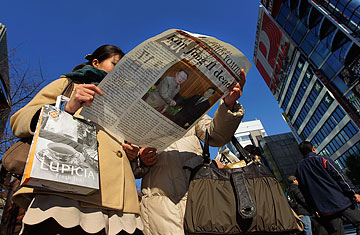
Women read about the death of Kim Jong Il in a Japanese newspaper in the Ginza district of Tokyo on Dec. 19, 2011
On Monday afternoon, a black-clad newscaster in Pyongyang, sitting in front of a bucolic backdrop of pine trees and snow-capped mountains, was barely able to get out the news. North Korea's longtime leader Kim Jong Il, she managed to say between sobs, had died on Dec. 17 of a sudden illness. "We make this announcement with great sorrow," she said, weeping.
The abrupt absence of a leader in one of the world's most unpredictable nations — though it wasn't entirely unexpected, given Kim's visibly declining health in recent years — sent a chill through Northeast Asia's corridors of power. South Korean President Lee Myung-bak convened an emergency security meeting and put the nation's military on highest alert.
At a press conference on Monday, Japan's Chief Cabinet Secretary, Osamu Fujimura, expressed his condolences to the country's western neighbor — and expressed "hope that this will not affect peace and stability on the Korean Peninsula." Fujimura said Japan had not ruled out whether to raise the level of alert of Japan's own army, but he added that Prime Minister Yoshihiko Noda had called for Japan to step up efforts to collect information on North Korea's movements and cooperate on sharing this information with South Korea and China. "Japan is watching carefully," says Choe Kan-ik, managing editor of the Korean-Japanese newspaper Choson Sinbo.
Though Kim Jong Un, Kim's third son, is expected to succeed his father, any possibility of a power struggle has North Korea's neighbors worried about security and stability in a region that was rattled last year after Pyongyang sank a South Korean warship, killing 46 sailors, and proceeded to shell South Korea's Yeonpyeong Island, killing two soldiers and two civilians.
Since Kim Jong Il took power after the death of his father Kim Il Sung, the Hermit Kingdom has been steadily building its nuclear arms program, conducting two nuclear tests in 2006 and 2009 and amassing missiles reportedly aimed at Japan and South Korea. Japan, along with the U.S. and South Korea, has urged the North to halt its uranium enrichment and allow international inspectors into the country. It is unclear what will become of the so-called six-party talks about the North's nuclear program, which have been stalled since 2008.
Tokyo says relations with Pyongyang cannot normalize until North Korea accounts for the abductions of Japanese citizens by North Korean agents in the 1970s and '80s. North Korea has admitted to the deaths or repatriation of 13 Japanese citizens, ostensibly to teach North Korean agents Japanese, but Tokyo insists there are more and that Pyongyang continues to withhold information on their fate.
Will Pyongyang cause trouble for the region as it transitions to a new regime? Analysts say North Korea is likely to be too preoccupied with its own dynastic drama to create any trouble — for the present. "North Korea is very unstable now," says Ha Tae Kyung, president of Tokyo-based Open Radio for North Korea. "The government wants to minimize the risk that could worsen [its domestic situation]."
Bradley Martin, author of Under the Loving Care of the Fatherly Leader: North Korea and the Kim Dynasty, says, "It's not really a different government [in Pyongyang], just a continuance of the same dynasty." Even if there were players in the North who wanted to destabilize the Kim clan's grip on power — and unsettle the region in the process — it's too soon to tell, he says, adding: "People don't normally go to war while they're holding a funeral."
